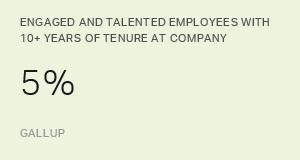Story Highlights
- Engagement helps create the conditions that allow OBCs to flourish
- The future of work will put new demands on efficient use of human capital
Outcome-based cultures (OBCs) encourage employees to achieve well-defined outcomes in a way that works best for them.
Independence is a fundamental working condition for these cultures, but freedom comes with a considerable amount of responsibility for employees. And even more so for their leaders.
In a culture dedicated to outcomes, leaders' primary responsibility is to define the right outcomes.
But the organization will never reach them -- and this culture will fall apart -- if leaders don't also align the right talent with the right jobs and focus on engaging the people in those jobs.
But how will leaders recognize if that alignment is any good? Judging alignment by outcome tells you what you need to know long after you need to know it -- and no business leader would accept that. Leaders need to determine if their people have the qualities that matter most to achieving a clear outcome as soon as the outcome is defined.
Here's the problem: A lot of things that matter can't be measured easily.
Gallup research shows that engagement is a prerequisite for better performance. And performance is required for outcomes. If leaders want to create the conditions that allow an OBC to flourish, measuring engagement is a good place to start. The Gallup Q12 employee engagement survey can help.
Function at Your Peak
All workplaces -- OBC or not -- are more productive and profitable, safer, and have less turnover when workers are engaged. Workers who are not engaged will generally meet minimum requirements at best. Actively disengaged workers are worse -- they might even sabotage the team and outcomes.
But engaged workers are emotionally invested in helping their company thrive. The Q12 measures the level of engagement from the workgroup level on up.
All people have specific requirements that organizations must fulfill for them to feel engaged at work. Gallup research -- including surveys with millions of people in thousands of companies worldwide over the course of decades -- categorizing those requirements into 12 aspects of work.
Gallup used this information about workplace needs to formulate the Q12 engagement survey, which evaluates levels of engagement from the workgroup to the organizational level. The results from the survey are very good to have. But a survey alone won't produce the results that organizations need. Companies need analytics and advice operationalized for various constituents, from team leads to the CEO.
Sometimes the Q12 engagement report indicates that the CEO needs to modify some things -- more communication about development opportunities, for instance.
Sometimes the report shows more dire problems such as widespread uncertainty about the company's mission and purpose. Incidentally, mission-driven workgroups suffer 30% to 50% fewer accidents and have 15% to 30% less turnover, but only 41% of U.S. workers say they know what their company stands for.
Until they know what the engagement deficit is, leaders can't fix it. And the value of that engagement can't be overstated. Engagement is a competitive advantage in every company, but to an OBC, engagement provides the energy, innovation, efficiency, sense of ownership and will to succeed that boosts outcomes.
It's not overstating the case to say that OBCs require a high rate of engagement to function at peak levels. A highly engaged, enthusiastic workforce is much likelier to achieve the outcomes that leadership wants. If the workforce is highly disengaged, an OBC will fail quickly.
Metrics That Matter
The basic premise of an OBC is that the right people are in the right role doing the right thing without requiring extensive leadership intervention.
Leaders decide on the right outcomes and use their valuable and limited time to focus on setting the organization's vision, direction and goals, which is what leaders do best.
It is up to managers to build relationships with each member of their team and to communicate, coach and turn strengths into high performance to attain the outcomes that leadership sets.
Individual contributors, in turn, use their talents to accomplish the outcomes in a way that suits them best, without the exhausting suspicion that they're wasting time and energy on pointless work.
Engagement metrics tell leaders how close they are to a culture that can do these things. Highly engaged workers are more adaptable and more likely to trust their leaders. When leaders decide to evolve the company culture into an outcome-based one, engaged workers do well. They may even be ready for an OBC before their leaders are.
Actively disengaged employees reject new initiatives out of hand. They'll never accept the responsibility of an OBC, nor will they succeed in one.
The Last Piece
OBCs democratize control, accountability, freedom and responsibility. OBCs can be exceptionally efficient, innovative and engaging, but to build one, leaders have to be willing to make the necessary changes.
Some leaders, however, have such a fundamental level of skepticism that they simply can't bring themselves to trust workers to do the right thing without vigilant oversight. Such leaders may never feel comfortable in an OBC.
But there are compelling reasons to try.
The future of work will put an even greater premium on performance, productivity and the efficient use of human capital. Competitive advantages will go to businesses that best integrate tech's possibilities and customers' demands. Tomorrow's workplace will require individualized talents of diligent, innovative people who can align themselves to outcomes -- and who do it with excellence every day.
Dictating the process details of how people work isn't as important as hiring them well, engaging them effectively, defining the best outcomes and paying attention to what they accomplish.
Leaders would be wise to start assessing if their company has what it needs to build an outcome-based culture. Right now, OBCs are a leadership option. But soon, they may be a leadership imperative.
Learn more about how Gallup can help your organization shift to a culture of performance development:
- Register your managers for an upcoming Leading High-Performance Teams course to give them the tools and techniques they need to inspire greater performance.
- Discover how to use the CliftonStrengths assessment to coach your teams to greater outcomes.
- Inquire about our performance management solutions, ranging from process redesign to manager training, designed to further your growth and development strategy.



